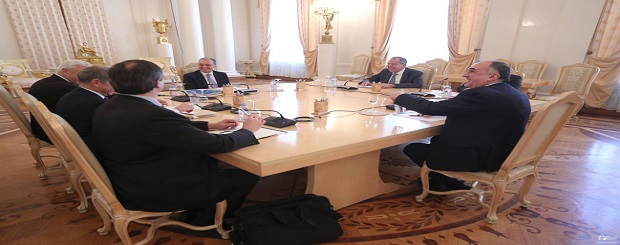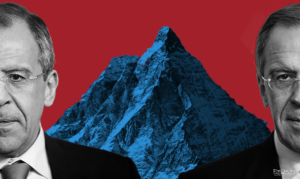
Stanislav Tarasov – Nagorno-Karabakh: Why does Russia need blah blah operation? – why does Russia need blah blah operation?
May 16, 2020 | Stanislav Tarasov – //regnum.ru/news//

annotation
Moscow is time to remember that Nagorno-Karabakh became part of the Russian Empire “for eternal times” in 1813 across the Gulistan world. It has long been clear that neither Baku nor Yerevan intends to make concessions on all available issues.
Breakthrough decisions can only be made by someone from external players. Russia must begin to act in order to bring down the nationalist discourse in Transcaucasia. New, post-viral times are coming.
Russian Foreign Minister Sergei Lavrov had a telephone conversation with his Armenian counterpart Zohrab Mnatsakanyan. The multilevel dialogue between Moscow and Yerevan, which are strategic partners and are members of the CSTO and the Eurasian Economic Union, is a common phenomenon and rarely causes increased interest among experts.
This time everything is different. The fact is that the Foreign Ministers of Russia and Armenia enter into dialogue for the third time in recent weeks, which, of course, is due to certain motivation, which the parties are traditionally silent about.

Statements by the press services of the foreign ministries of the two countries, such as “discussing current issues of bilateral relations, interaction within the CIS, EurAsEC and the Collective Security Treaty Organization, as well as the problems of the Nagorno-Karabakh settlement,” can be classified as familiar diplomatic verbiage.
If only because each of the topics indicated contains its own specifics, and if the parties link or concentrate attention to the settlement of the Nagorno-Karabakh conflict, then it is important to understand how and why they do it.
Recall that earlier Lavrov, speaking at a round table with participants in the Public Diplomacy Support Fund named after A.M. Gorchakova, said that the most important step in implementing the UN Security Council resolution on the Karabakh settlement is the signing by the parties of a document adopted in Moscow in April 2019.
This is a document that was adopted in April 2019 in Moscow at a meeting of the Foreign Ministers of Russia, Armenia, and Azerbaijan with the participation of the co-chairs of the OSCE Minsk Group. These documents presuppose progress in the settlement on the basis of a phased approach, and at the first stage “the liberation of a number of areas around Nagorno-Karabakh and the unblocking of transport, economic and other communications”.

It should be noted that such a “reminder” was equally applied to both Baku and Yerevan. But Armenia was the first to react sharply. Mnatsakanyan stated that approaches to a phased settlement were demonstrated in 2014 and 2016, “but they were unacceptable for the Armenian parties,” and “since 2018, negotiations have been limited to discussing assessments, approaches of the parties to individual elements.”
In such a situation, Azerbaijan could come up with some innovative proposals, such as the priority for resolving issues such as the liberation of areas and clarifying the status of Nagorno-Karabakh. But Baku did not move a single step, began to transform everything into elements of an information war, accusing Yerevan, on the one hand, of “disrupting the efforts of the Minsk Group to resolve the conflict,” on the other, threatening it with the use of force, although such a tactic of actions at lunchtime will be a hundred years and she never gave results.
At the same time, Azerbaijani Foreign Minister Elmar Mammadyarov during the summit of the CIS Foreign Ministers spoke of “commitment to an early political settlement of the conflict” that “negotiations cannot last forever and should not serve to continue and maintain the situation that arose as a result of the use of force, occupation and ethnic cleansing. ”
Therefore, one gets the feeling that for some reason Baku thinks that someone should once present him with Nagorno-Karabakh on a “platter with a blue border”. Will not present. Maybe that is why the Kremlin has forces that continue to pursue a romantic policy of the so-called equidistance in the Nagorno-Karabakh conflict.
The resource of such diplomacy is close to exhaustion, and not only Moscow alone should deal with the ungrateful problem of ensuring the security of the region. Why is only Russia actively acting as a mediator between Baku and Yerevan in the process of resolving the conflict, while the other co-chairs of the Minsk Group take a passive position? Recall that in 2016 in early April in the Nagorno-Karabakh conflict took place.
As a result, on April 5, agreements were reached on a ceasefire during a meeting of the chiefs of general staffs of Azerbaijan and Armenia in Moscow. And what would happen if Russia took a break then? The Kremlin must gather courage and declare to the Azerbaijani and Armenian sides about their national interests in the region in order to deprive them of the opportunity to play the Russian card in their interests.

But in order to return to the starting position, Lavrov needs to abandon the regime of secrecy in the negotiation process, stop striving to please everyone, begin to call a spade a spade. Like it or not, over the decades of the negotiation process with the mediation efforts of the OSCE Minsk Group, virtually nothing has been created to supplement the Karabakh dossier. The Minsk Group has nothing to do with the signing of the ceasefire agreement in 1994.
Moreover, they do not have publicly proclaimed positive aspirations of the conflicting parties. And now, if we take into account the position of the co-chairing countries of the OSCE Minsk Group, we see the lack of desire on their part to come forward with detailed explanations.
As the well-known Russian researcher Sergei Markedonov rightly writes, “the peaceful settlement in fact has been replaced by conflict management, attempts to reduce the number of incidents, implement mechanisms for the exchange of prisoners of war and finally introduce effective monitoring of ceasefire violations.”
And just the words from the blah blah series: either a “package plan” (resolving all controversial issues synchronously), then a “phased approach” (involving a stage-by-stage algorithm), or a project of a “common state”.
In November 2019, it was 12 years since the elaboration of the Madrid Principles, which included the main provisions of a peaceful settlement. Last July marked the tenth anniversary of the publication of the updated version of the “basic principles”, according to which the Minsk Group co-chairing countries recommended that the conflicting parties “reach an agreement”.
However, Markedonov points out, the Madrid Principles remain a “rhetorical figure,” not a valid algorithm for peace. Therefore, it is time for Moscow to remember that Nagorno-Karabakh became part of the Russian Empire “for eternal times” in 1813 across the Gulistan world. It has long been clear that neither Baku nor Yerevan intends to make concessions on all available issues.
Breakthrough decisions can only be made by someone from external players. It’s time for Russia to take action to bring down the nationalist discourse in Transcaucasia. However, in Smolenskaya Square they prefer not to pay attention to this, naively believing to thus achieve loyalty on the part of regional multi-ethnic entities. But there come new, post-viral times.
May 16, 2020
Stanislav Tarasov
//regnum.ru/news/polit/2951696.htm
ENGLISH TRANSLATION “lousavor avedis”
